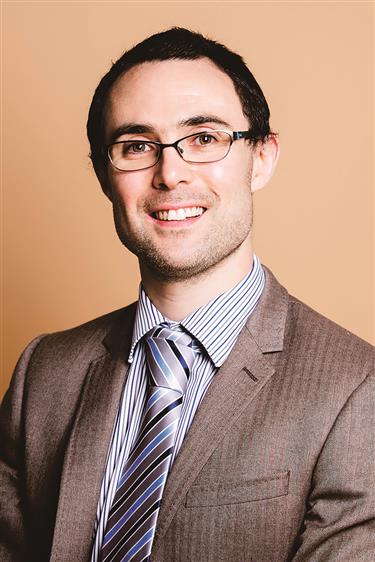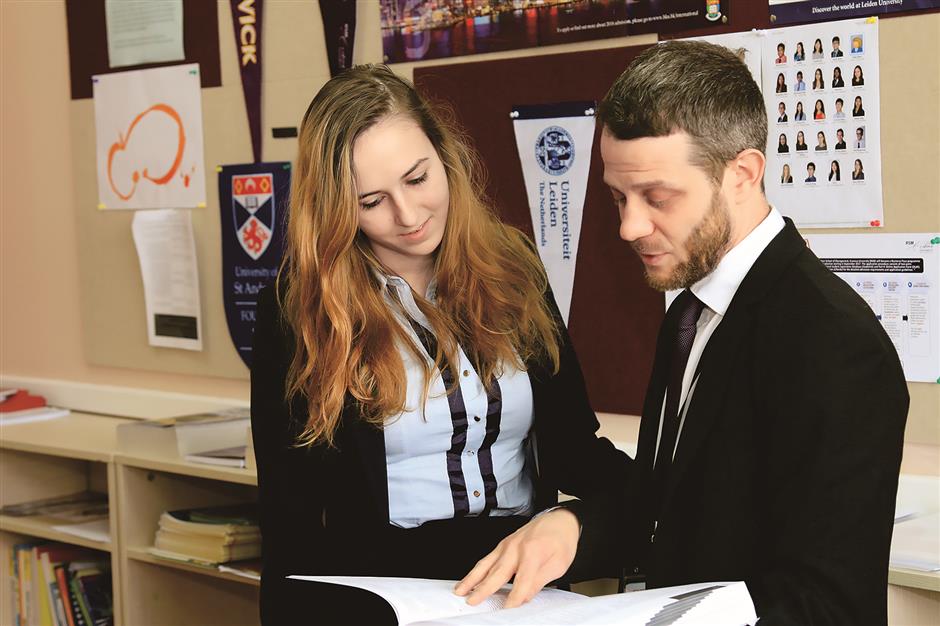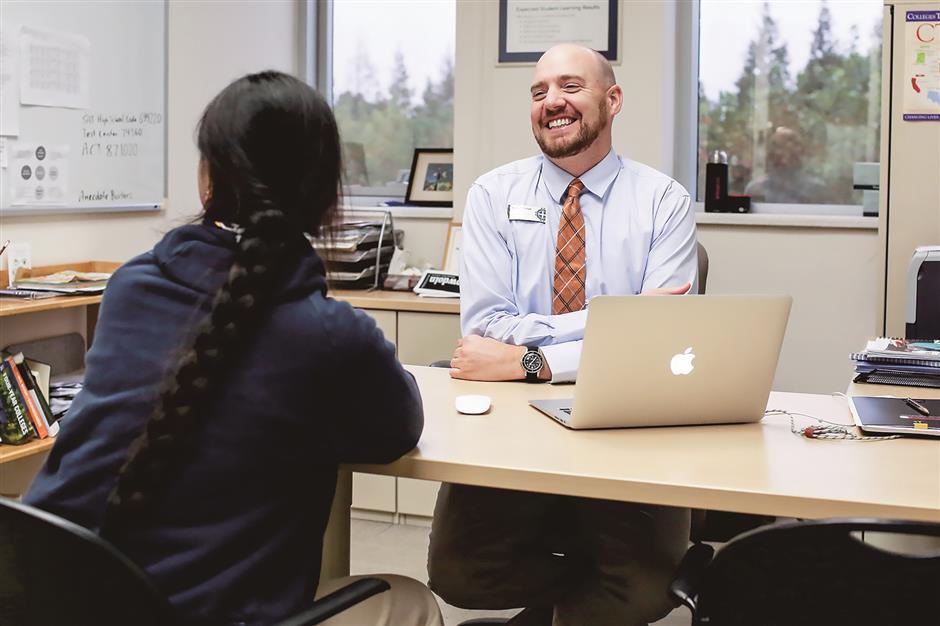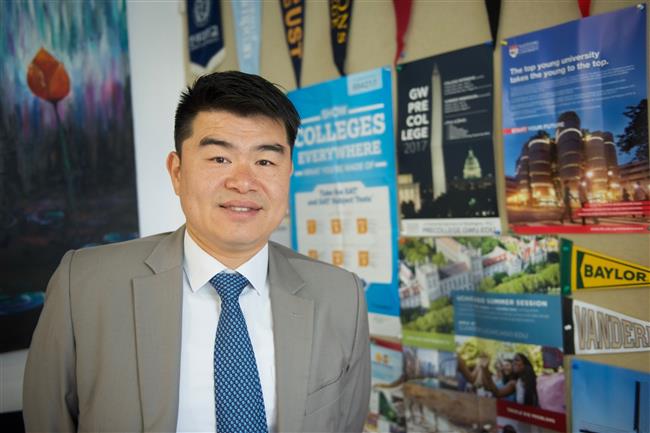University of life
Experts from four Shanghai international schools offer comforting guidance to final year school leavers currently stressing over forthcoming exams, results and whether they meet the criteria of the university they want to join.

The school leavers are always stressing over forthcoming exams, results and whether they meet the criteria of the university they want to join.
Standing out from usual college crowd
Applying to university is more challenging than ever. With the increase in international applications, competition for places has never been greater. So, what can you do to make your application stand out from the crowd?
The results of exams already taken and predictions of future exams before leaving school are important. Your results will be the first thing an admissions tutor will look at. In the UK, students apply for admission to a specific course at a university. When applying to universities in the US, students usually apply for general admission to the institution. In both cases, it is important to show you are academically prepared. To adapt a popular phrase, results will get you through the door, but it’s your character that will get you noticed. Whether writing a personal statement, or preparing for an interview, you will need to show more than just an ability to pass exams.

Mark Batten is head of Sixth Form, Harrow International School Shanghai.
The first question to ask is, are you genuinely interested in the subject that you are intending to study? This may seem rather obvious, but how many young people intending to study degrees related to business can name companies currently in the top 10 of the Fortune 500 list?
It’s important to remember that universities are centers of research. Consider how you can show academic curiosity. This is particularly important for pupils applying to science-based courses. What research is the university undertaking? Read articles related to your area of study and discuss what you think about them. It’s impressive to show that you have considered contrasting viewpoints, as this is a sign of an inquiring mind.
Reflect on the skills you’ve gained through your extra-curricular activities. Don’t just run through a list of activities you’ve taken. Relate the skills you’ve gained to your application. For example, an aspiring lawyer might discuss the experience they’ve gained in public speaking, through activities like debating. Someone aspiring to work in the business world might reflect on the skill of teamwork gained through playing on a sports team.
Finally, have you considered where the course might lead you to in the world of work? Have you found opportunities for volunteering or work experience? What did you learn from this?
Good luck!
(The article is contributed by Mark Batten, head of Sixth Form, Harrow International School Shanghai.)

Mark Weston (right), head of Higher Education Guidance at BISS Puxi, talks with his student.
Making sure you are a good college fit
With Year 13/Grade 12 students currently approaching the end of their studies at school, many are looking forward to embarking on the next stage of their education at colleges and universities around the world.
While there are many similarities in what institutions around the world are looking for in an applicant, there will also be some differences due to the fact that different countries around the world have different systems of university education.
For instance, students in the UK usually specialize in a subject area (such as law or biochemistry) right from the start of their studies and will therefore need to demonstrate to the person evaluating their application, often a subject specialist, that they have the academic knowledge, skills and potential to be successful on their chosen course.
Extra-curricular activities and work experience will be taken into consideration, but students must demonstrate how these activities relate to their proposed course of study — in terms of knowledge and/or skills.
In other countries, such as the US, it is common to take a range of subjects before specializing after two years of study, and students should see themselves as applying more to an institution, rather than to a particular course. Students applying to the US will therefore need to demonstrate to the admissions officer evaluating their application that they are a good “fit” for the institution.
As well as providing evidence of your academic achievements, which includes grades, strength of curriculum, and admission test scores, you will need to give the admissions team an idea of who you are as an individual, via a college essay, list of extra-curricular activities and letters of recommendation. When writing the college essay, you should ask yourself not “what does the admission committee want to read” but instead ask “what is it about me that I want to be sure colleges know?”
According to the 2017 NACAC State of College Admission survey, an additional top factor for international students to consider is English proficiency. A greater proportion of colleges rated the essay/writing sample as being of considerable importance for international applicants, because of the additional confirmation of English skills that the essay provides.
Most US universities consider the composition of the freshmen class as a whole in order to ensure that a diverse group of students with a variety of academic and extracurricular interests will enrich the campus experience for everyone. What individual qualities can you add to campus? It’s worth remembering that depth may be more important than breadth when it comes to extra-curricular activities.
It’s less important for you to have done lots of different activities than it is to demonstrate that you have shown commitment to a few activities that are meaningful to you.
Wherever in the world you are thinking of studying, the following attributes will make you a strong undergraduate/freshman candidate: the ability for genuine independent study; a willingness to experiment and take risks, intellectually and creatively; the ability to show initiative and to approach problems creatively and a willingness to ask questions.
If you are applying to study for a particular program, course or major, such as mechanical engineering, it is essential that you demonstrate an interest in, and engagement with, the subject you propose to study beyond the limits of the curriculum.
Universities are looking for students who can take on board new ideas and run with them. You could consider the following ways of developing your knowledge: read around your subject; visit museums, galleries exhibitions; find relevant work experience and take an online course.
Resources such as FutureLearn, iTunes University and Coursera have hundreds of free courses that may either ignite your interest in a subject area, or develop an existing interest.
The Khan Academy website (www.khanacademy.org) provides free online classes and resources for a number of subject areas, including math, science, economics, humanities and computing, as well as content from institutions such as the Metropolitan Museum of Art, The British Museum and NASA.
Read newspapers and relevant journals; watch TED talks or look up your subject area on YouTube and listen to relevant Podcasts.
You should be engaging critically with what you are reading/watching/listening to, so record your thoughts on the extra work you are going to do. Consider keeping an academic journal, detailing what you have read/done to extend your subject knowledge.
The key question to ask about your additional “super-curricular” work is “What did I get out of it? Where did I take it?”
Finally, university offers should be seen as a match to be made rather than a prize to be won.
Instead of matching yourself to a university, try to pick a university that matches you.
A good question to ask is what qualities and skills does a university look for when considering applicants? Is there a “mission statement” on the university website, and does it align with your outlook, interests and values?
(The article is contributed by Mark Weston, head of Higher Education Guidance at BISS Puxi.)

Patrick Love, a high school college counselor at Concordia, gives application advice to a student.
Using your strengths and characteristics
Applying to college is a high school rite of passage, and it goes without saying that it is a particularly stressful time for students. The daunting task of compiling the experiences and noteworthy accomplishments of their academic careers is a source of anxiety for most, if not all, high school seniors.
But aside from working closely with their college counselors, how else can students be better prepared for the application process. Here are a couple of suggestions to consider.
First, take time to reflect and get to know yourself. At Concordia International School Shanghai, students become familiar with their own strengths and character starting in middle school. By assessing their values in action (VIA), students have an awareness of how they use their character strengths in the moments when they feel most alive, and in moments of stress. What strengths do you use when you contribute to the classroom environment? What strengths do you use when participating in the community around you?” These are important questions to ask yourself. The answers tell you who you are as a person, and they are the foundation of who you will be as a college applicant.
Second, research schools and programs in depth. You should know as much as possible about a school you hope to attend and its programs.
Make lists of the things you like and dislike about each school. In your application, demonstrate this knowledge by connecting your own strengths and interests to specific characteristics within each school. Students who successfully complete these two tasks give admission officers a clear idea of who they are as a learner, how they will contribute to the community, and the strategies they will use to engage in each school’s specific learning environment.
(The article is contributed by Patrick Love, a high school college counselor at Concordia.)

John Liu is head of University Guidance and Professional Growth coordinator at the Yew Chung International School of Shanghai.
Differences of study in the UK and US
For many international students, two standout places to apply for university placements are in the US and UK. If a student is thinking of applying to schools in either of these countries, or applying to both, it’s important to bear in mind that when going through the application process, the US and UK are the incredibly polar-opposite. Below is a brief overview of the ways in which a student must tailor their application depending upon the country to which they are applying.
• Highlighting your achievements
Admissions officers at US colleges are looking for students who have chosen strong courses and have achieved academically. They are looking to see whether the students have challenged themselves and that the challenges they have selected relate to the major they are applying for. For example, if you want to be an engineer (which is a very specific major), then your courses in secondary school need to reflect that you’ve challenged yourself in math and science courses. But if you have an undeclared major, you’d need to show that you’ve challenged yourself to really explore your own learning in a variety of courses.
Community-wise, admissions representatives want to see that students are balanced and committed to something they care about. Last year, for example, a student at YCIS Shanghai was accepted to the University of Pennsylvania and she applied to do sociology with a focus on gender studies. In her application, she shared that she had not only participated in her co-ed touch rugby team for three years, but become its captain. She also wrote about a summer photography program in New York, which focused on the concept of race and gender and explained that this formed her interest in wanting to study sociology. This was a winning combination, illustrating she was well rounded, committed to an activity and showed a clear understanding of what she wanted to study.
When applying to the UK, what you’re highlighting must be clearly tied to the course you’re applying for. At YCIS, we had a student this year who received an early offer from Cambridge University for psychology. So this past summer she read a lot of psychology texts and she built up her knowledge of neuroscience because UK universities care about how have you pushed yourself and learned outside academically. She went and did a summer course in psychology.
• How to discover what makes you a desirable student
Determining what makes you a desirable student in the US is all about research. Go and talk to the universities when they visit Shanghai. The admissions officers will be very honest and will tell you what they’re looking for. Tell them about your extra-curricular activities, your studies, what are you doing? They’ll be more than helpful. In the UK this also takes a bit of research. Go onto the UCAS website to find out which subjects you should be taking. In UK schools, it’s all down to which courses you’re taking in the last two years of IB or A-levels — that’s what’s most important.
• Essay writing tips
In the US: Beyond academic results, the application essay is your first opportunity to really show off the colors of who you are to the admissions officers. They will be looking at the challenges you’ve overcome, how that made you who you are, and they’ll have questions like, “where do you come from and why is that important?” You need to take time to figure out how to set yourself apart from the other students in the pile of applications. Saying you’re an international student is often not enough — it needs to be something more personal. Let’s imagine if you were a massive fan of “Lord of the Rings,” you could explain not just why you love the book series, but also what that says about you and how that can relate to your choice of major.
In the UK: While the US want to know you as an individual and as a person, the UK wants to know about you, your academic development and growth, and how that led you to want to apply for that particular major. If you’re applying for classical history, for instance, you would need to explain why are you interested in the topic, how you came to learn about it and what knowledge and skills have you developed during IGCSE and IB that relate to the major. Something that is particularly important in the UK is that they want to see the questions and areas you want to explore and research on the subject you have not yet been able to explore during your time at secondary school.
You can also tie your extra-curricular activities to your academic interests. For example, if you’re interested in history and you took part in Model United Nations, you could explain that, “Modern United Nations allowed me to understand how history works in the context of politics to frame the understandings of a countries beliefs or values, and how that has added to my overall interest and is why I want to pursue a history education.”
• Further tips for both countries
Be sure to take advantage of the summers. This is a perfect time to do an internship, enrol in a summer school abroad, do extra reading on the major you’re interested in, or dedicate time to something fulfilling that interests you. All of these things will help you with your application.
Last, no matter which country or major you’re applying for, the University Guidance Office at your school will be able to help guide you.
Be sure to visit the counsellors frequently and seek their advice and feedback. They are there to help direct a successful next step in your education journey and beyond!
(The article is contributed by John Liu, head of University Guidance and Professional Growth Coordinator at the Yew Chung International School of Shanghai.)















